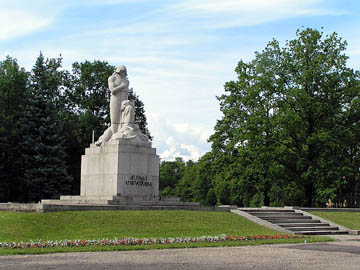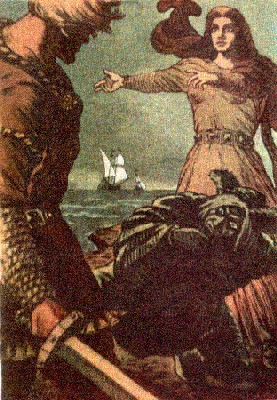Lāčplēsis is an epic poem by Andrejs
Pumpurs, a Latvian poet, who wrote it between 1872-1887 based on local legends.
Lāčplēsis is regarded as the Latvian national epic.
The poem recounts the life of the legendary hero Lāčplēsis, chosen by the gods to become a hero of his people. His name means “Bear-slayer”, because as a young man, living as the adopted son of the Lord of Lielvārde, he kills a bear by ripping its jaws apart with his hands. At the castle of Lord Aizkrauklis, he spies on the activities of the witch Spīdola (Spīdala), who is under the control of the Devil, and the holy man Kangars, who is in reality a traitor plotting to replace the old gods with Christianity. Spīdola tries to drown Lāčplēsis by throwing him into the whirlpool of Staburags in the Daugava, but he is rescued by the goddess

Lāčplēsis
monument dedicated to Jelgava liberators (Latvian War of Independence)
Staburadze and taken to her underwater crystal castle. There Lāčplēsis
meets and falls in love with the maiden Laimdota. Shortly afterwards, Lāčplēsis
becomes friends with another hero, Koknesis (“Wood-bearer”), and they study
together at the Castle of Burtnieks, Laimdota’s father.
Kangars provokes a war with the Estonians, and Lāčplēsis
sets out to fight the giant Kalapuisis (Estonian: Kalevipoeg [the
“Kalapuisis” name is derived from kalapoiss], probably refers to the hero of
the Estonian epic poem Kalevipoeg), to win the hand of Laimdota. He defeats the
giant, and the two make peace and decide to join forces to fight their common
enemy, the German missionaries, led by the priest Dietrich (Dītrihs). Lāčplēsis
performs another heroic deed by spending the night in a sunken castle, breaking
the curse and allowing the castle to rise into the air again. Laimdota and Lāčplēsis
are engaged. In the following episodes, Laimdota reads from the old books about
the Creation and ancient Latvian teachings.
